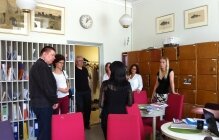incluD-ed’s first field visit in Helsinki, Finland (1/3)
Fri, 04/07/2014
On 26 May 2014, the European Network for Inclusive Education and Disability, co-funded by the European Social Fund, incluD-ed, held its first field visit in the network’s history in Helsinki, Finland. Aulis Mäkkinen from Kynnys, the Finish partner organisation of incluD-ed, organised meetings at three different institutions related to education:
1. Etu-Töölö Upper Secondary School, a centre recommended by Helsinki’s Education Department;
2. Finnish National Board of Education (FNBE); and
3. CIMO, a national agency responsible for international mobility.
These visits have allowed incluD-ed partners to gain insight into the Finnish education system, to experience its focus and attitude towards the inclusion of students with special educational needs and to gather best practices, and also to understand why Finland excels in the OECD PISA study.
-
Field visit at the Etu-Töölö Secondary School
The management team of the Etu-Töölö Secondary School, Mrs Ella Similä (School Principal) and Mrs Saila Linkopuu (Deputy School Principal) as well as the school’s special education (SEN) teacher Mrs Mari Salonen welcomed the incluD-ed network partners and started with a short presentation of the Finnish education system and the school itself. The Etu-Töölö Secondary School has about 650 students aged 16‒19 years old and has a special focus on entrepreneurship and helping it “to be understood in all its possible meanings – from self-management and autonomy to social responsibility” as Mrs Similä underlined.
Early detection of special educational needs and support measures offered
First year students that arrive at the school are always tested to see if they have dyslexia or other learning difficulties. Mrs Linkopuu mentioned that last autumn, 220 first graders were tested and about 50% did not pass the test. Out of these 100 students, half actually indicated having some kind of problems with their reading or writing abilities. In personal interviews with the SEN teacher, Mari Salonen, they then talked about where these problems might come from (e.g. Finnish as their second language) and the solutions the school can offer to them (e.g. Finnish language courses). Students with dyslexia, Asperger, ADD, ADHD, or impaired hearing or vision that might need more overall support for their studies are also advised to take part in different courses offered by the SEN teacher that are designed to support studying. In general, two courses with 20-30 students (mainly on learning strategies) are offered every year.
To further support students, the Etu-Töölö Secondary School has a ‘student welfare team’ (composed of a psychologist, a social worker, study/career counsellors, a special education teacher and a health nurse) and provides other forms of support such as extension time and a separate room for the tests, longer pauses in the listening comprehension tests and computers for writing. “The support offered is the same that the Finnish Matriculation Examination Board allows for the dyslectic students within the national matriculation tests at the end of their studies”, Ms Salonen underlined. “If these adjustments are not enough, then I talk with the student and we make suggestions for the teachers to make possible arrangements. These special arrangements are noted down in a schools’ internal communication system, called WILMA, where all the necessary data concerning the student can be found.”
Mrs Similä, the school principal, said that the use of modern technology such as tablets and computers etc., a culture of open attitudes and human values are essential to addressing the special educational needs of students.
As in other European countries, class sizes are quite big and sometimes it is not easy to make adjustments as Ms Salonen underlined.
incluD-ed had the opportunity to speak to some students and was astonished by their confidence and openness in speaking about their experiences at the Etu-Töölö Secondary School. While later visiting the school building, the incluD-ed network partners saw the pupils working autonomously in groups on their different projects.
Conclusion from the Etu-Töölö Upper Secondary School field visit
When asked which aspects of inclusive education at the Etu-Töölö Upper Secondary School impressed the network partners the most, all partners were surprised by the tough selection process to attend upper secondary schools in Finland, but also by the autonomy of pupils and the curriculum. Aulis Mäkinen (Kynnys) said the Etu-Töölö Upper Secondary School is a “good example of the situation in Finland”. Students with learning and behaviour disorders are considered as ‘problematic’ in a usual school, very concerned about maintaining a high level of education.
Mäkinen underlined that the situation in comprehensive schools in regards to inclusion is good: “Inclusion has in fact not gone so far in Finland, even if the situation is better. Now there are ‘inclusive schools’ with common yards so that the pupils of special classes can play together and that students with disabilities have their personal assistants”, but still a lot has to be done to achieve a fully inclusive education system in Finland. He stated that “Education is not given enough resources even if it is valued.”
|
incluD-ed thought about which aspects Finland could improve to make its schools more inclusive and found that almost the same recommendations are valid for most European countries: 1. Teacher education and training needs to include the main principles of inclusion from the beginning; 2. More financial resources need to be invested in education and budget cuts stopped so that schools have the resources for qualified teachers and school assistants; and 3. The pace of the education system should be slowed down a bit to assure that all pupils are able to follow. |
***
incluD-ed’s first field visit in Helsinki, Finland (1/3)



























